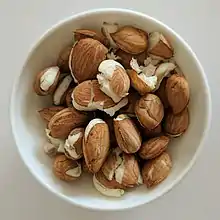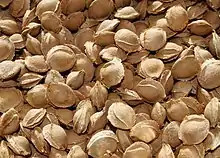Apricot kernel
An apricot kernel is the seed of an apricot, which is located within the hard endocarp, and together they form the stone or pit.[1][2] It is known for containing amygdalin, a poisonous compound. Together with the related synthetic compound laetrile, amygdalin has been marketed as an alternative cancer treatment. However, studies have found the compounds to be ineffective in the treatment of cancer, as well as potentially toxic or lethal when taken by mouth, due to cyanide poisoning.[3]


Use
The kernel is an economically significant byproduct of fruit processing and the extracted oil and resulting press cake have value.[4] Apricot kernels are sometimes added to soaps or scrubs as an exfoliant.[5] Apricot kernel oil gives Disaronno and some other types of amaretto their almond-like flavour.[6]
Potential toxicity
Apricot kernels can cause potentially fatal cyanide poisoning when consumed. Symptoms include nausea, fever, headaches, insomnia, increased thirst, lethargy, nervousness, various aches and pains in joints and muscles, and a drop in blood pressure.[7][8][9][10][11][12][13]
In 1993 the New York State Department of Agriculture and Markets tested the cyanide content of two 220 gram (8 oz) packages of bitter apricot kernels imported from Pakistan that were being sold in health-food stores as a snack. The results showed that each package, if consumed entirely, contained at least double the minimum lethal dosage of cyanide for an adult human; the product was removed from stores.[14] There was one reported case in the medical literature of cyanide toxicity from apricot kernels from 1979 to 1998 in the United States, a non-fatal poisoning by purchased apricot kernels.[15]
The Food Safety Authority of Ireland advises against eating either bitter or sweet varieties of apricot kernel due to the risk of cyanide poisoning and advises consumption be limited to one to two kernels a day for an adult. They also advise against consuming bitter almond for the same reasons.[16]
See also
References
- Considine, Douglas M. (6 December 2012). Foods and Food Production Encyclopedia. Springer Science & Business Media. p. 776. ISBN 978-1-4684-8511-0.
- Solomon, Eldra; Berg, Linda; Martin, Diana W. (16 February 2004). Biology. Cengage Learning. p. 679. ISBN 1-111-79434-0.
- Milazzo S, Horneber M (2015). "Laetrile treatment for cancer". Cochrane Database Syst Rev (Systematic review) (4): CD005476. doi:10.1002/14651858.CD005476.pub4. PMC 6513327. PMID 25918920.
- Galanakis, Charis M. (14 September 2019). Valorization of Fruit Processing By-products. Elsevier Science. pp. 44–. ISBN 978-0-12-817373-2.
- Alex Muniz. "Exfoliation - AskMen". AskMen. Retrieved 11 June 2016.
- Troy, Eric (September 6, 2012). "Amaretto Liqueur". Culinary Lore.
- "Eating apricot kernels can kill you, Government warns". The Telegraph. Retrieved 18 January 2017.
- "Apricot kernels don't cure cancer, and they might poison you". The Verge. 10 August 2016. Retrieved 14 May 2017.
- "APRICOT KERNEL: Uses, Side Effects, Interactions and Warnings - WebMD". WebMD. Retrieved 14 May 2017.
- "Whole Foods is trying to poison people with apricot kernels | The Daily Dot". The Daily Dot. 22 June 2016. Retrieved 14 May 2017.
- "Organic business fined for selling toxic apricot kernels". ABC News. 26 October 2016. Retrieved 14 May 2017.
- Akyildiz, B. N.; Kurtoğlu, S.; Kondolot, M.; Tunç, A. (1 January 2010). "Cyanide poisoning caused by ingestion of apricot seeds". Annals of Tropical Paediatrics. 30 (1): 39–43. doi:10.1179/146532810X12637745451951. PMID 20196932. S2CID 206847508.
- "Apricot kernels pose risk of cyanide poisoning | European Food Safety Authority". www.efsa.europa.eu. Retrieved 14 May 2017.
- Imported Bitter Apricot Pits Recalled as Cyanide Hazard By DENNIS HEVESI Published: Friday, March 26, 1993 – The New York Times
- Suchard JR, Wallace KL, Gerkin RD (December 1998). "Acute cyanide toxicity caused by apricot kernel ingestion". Ann Emerg Med. 32 (6): 742–4. doi:10.1016/S0196-0644(98)70077-0. PMID 9832674.
- "Apricot Kernels (Bitter and Sweet)". www.fsai.ie. Food Safety Authority of Ireland. Retrieved 20 January 2021.